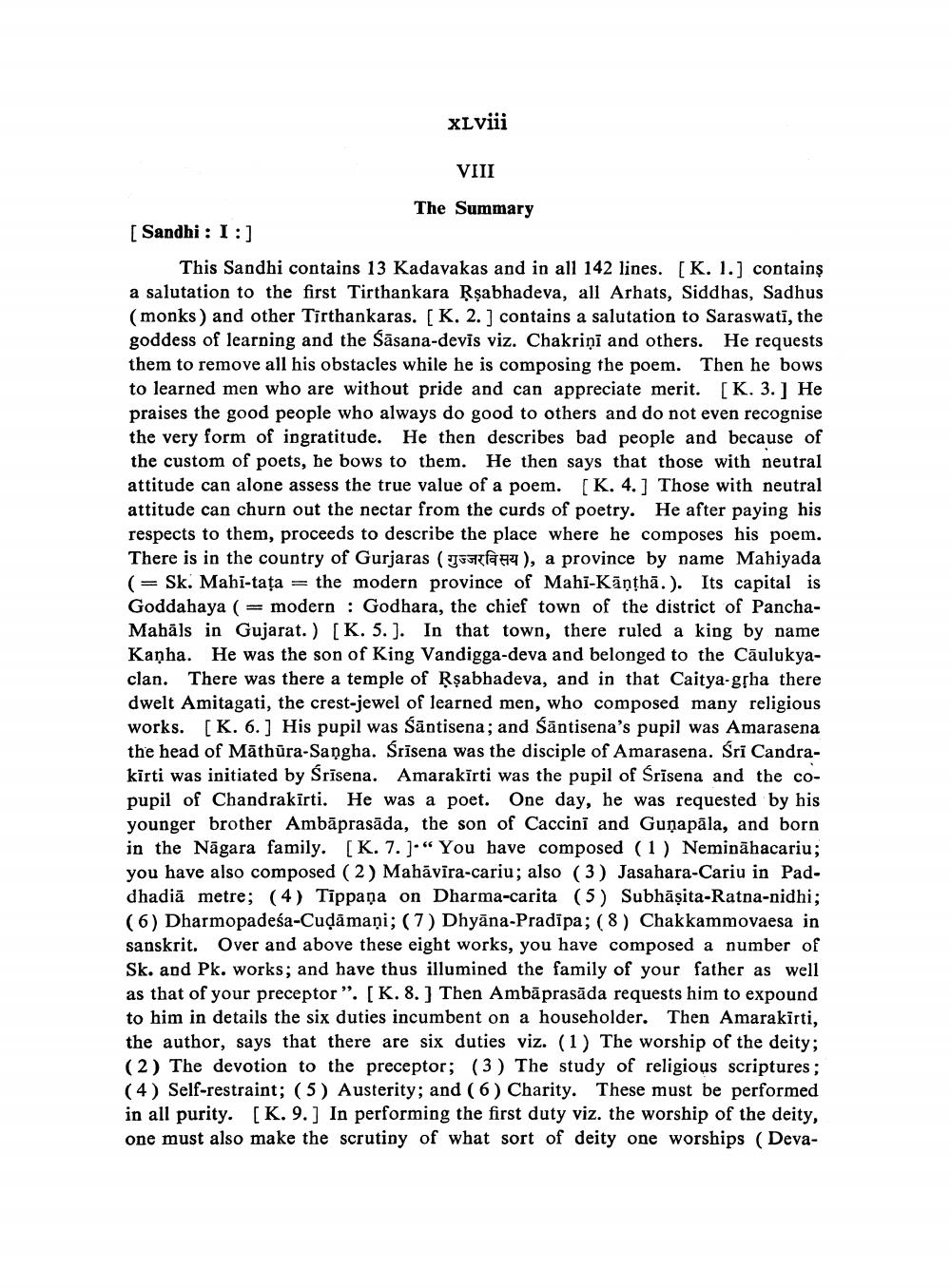________________
XLviii
VIII
The Summary [ Sandhi : 1:]
This Sandhi contains 13 Kadavakas and in all 142 lines. [K. 1.] contains a salutation to the first Tirthankara Rşabhadeva, all Arhats, Siddhas, Sadhus (monks) and other Tirthankaras. [K. 2.) contains a salutation to Saraswati, the goddess of learning and the Sāsana-devis viz. Chakriņi and others. He requests them to remove all his obstacles while he is composing the poem. Then he bows to learned men who are without pride and can appreciate merit. [K. 3. ] He praises the good people who always do good to others and do not even recognise the very form of ingratitude. He then describes bad people and because of the custom of poets, he bows to them. He then says that those with neutral attitude can alone assess the true value of a poem. (K. 4.] Those with neutral attitude can churn out the nectar from the curds of poetry. He after paying his respects to them, proceeds to describe the place where he composes his poem. There is in the country of Gurjaras ( Toplay), a province by name Mahiyada (= Sk. Mahi-taţa = the modern province of Mahi-Kānshā.). Its capital is Goddahaya ( = modern : Godhara, the chief town of the district of PanchaMahāls in Gujarat. ) [K. 5.). In that town, there ruled a king by name Kaņha. He was the son of King Vandigga-deva and belonged to the Căulukyaclan. There was there a temple of Rşabhadeva, and in that Caitya-gļha there dwelt Amitagati, the crest-jewel of learned men, who composed many religious works. [K. 6. ] His pupil was sāntisena; and śāntisena's pupil was Amarasena the head of Māthūra-Sangha. Srisena was the disciple of Amarasena. Sri Candrakirti was initiated by Srisena. Amarakīrti was the pupil of Srisena and the copupil of Chandrakirti. He was a poet. One day, he was requested by his younger brother Ambāprasāda, the son of Caccini and Guņapāla, and born in the Nāgara family. [K. 7.].“ You have composed (1) Nemināhacariu; you have also composed (2) Mahāvira-cariu; also (3) Jasahara-Cariu in Paddhadiā metre; (4) Tīppana on Dharma-carita (5) Subhāṣita-Ratna-nidhi; (6) Dharmopadeśa-Cuļāmaņi; (7) Dhyāna-Pradipa; (8) Chakkammovaesa in sanskrit. Over and above these eight works, you have composed a number of Sk. and Pk. works; and have thus illumined the family of your father as well as that of your preceptor". [K. 8. ] Then Ambāprasāda requests him to expound to him in details the six duties incumbent on a householder. Then Amarakirti, the author, says that there are six duties viz. (1) The worship of the deity; (2) The devotion to the preceptor; (3) The study of religious scriptures; (4) Self-restraint; (5) Austerity; and (6) Charity. These must be performed in all purity. [K. 9.] In performing the first duty viz. the worship of the deity, one must also make the scrutiny of what sort of deity one worships (Deva




